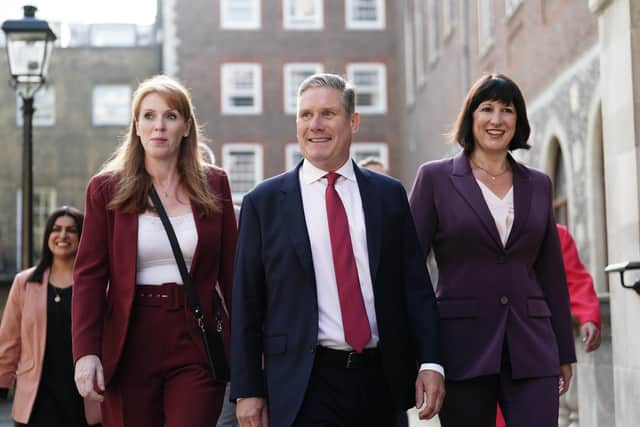Labour’s narrative must also now be about how an alternative government can deliver a better tomorrow - David Blunkett
Because, as we have been reflecting this week, it is a year yesterday that so many of us were shocked to learn of the sad death of Queen Elizabeth II. Of course, we shouldn't have been shocked because of her longevity and the known frailty which she had overcome just two days earlier, in hosting first Boris Johnson, then Liz Truss at Balmoral Castle in North-East Scotland.
On September 6, as so often in her long reign, she set aside any feelings she might have had in accepting the resignation of one prime minister and, as our constitution requires, appointing another.
Advertisement
Hide AdAdvertisement
Hide AdSo much had happened over those fateful latter years. From the referendum on our exit from the European Union in 2016; through the pandemic, the rollercoaster years of Boris Johnson and the Conservative Party contest over the summer of 2022, one key, stable element was Queen Elizabeth.


So much happened in the weeks after her death that, even now, it's hard to instantly recall the turmoil and almost constant changes of a year ago.
As we know, things went badly wrong, but it could have been worse. Had King Charles III not stepped up into the role so seamlessly; had our own constitutional checks and balances not worked effectively, I genuinely dread to think where we might be today.
The economic turmoil that followed the emergence of Liz Truss as Prime Minister must be seen in the context of the chipping away of confidence in a whole range of our institutions and constitutional bulwarks, which, like a retaining wall, hold the building together.
Advertisement
Hide AdAdvertisement
Hide AdFrom the judiciary to the BBC; from our great academic institutions to the Bank of England, it was open season on our traditional defences against instability and fracture.
The extraordinary budget of September last year was delivered on the Friday, as Labour met for its annual conference in Liverpool. The timing from the point of view of the Conservatives could not have been worse, but there has been little comment on the cracks which started to emerge within Labour ranks in dealing with the aftermath of Kwasi Kwarteng’s proposals, followed up, as they were, by the then Chancellor’s inept interview on BBC television on the Sunday morning.
The Labour leadership understood all too well from lessons of the past that great care is needed in dealing with the international financial markets. Something which the Conservatives had historically taken for granted. I wonder, now, whether there are not lessons to be learnt from that extraordinary period in ensuring that caution is not so substantially reinforced by the events of the 49 days of the Truss premiership, that future policy might tip in the very opposite direction.
It is worth recalling that Liz Truss was forced to appoint Jeremy Hunt as Chancellor to steady the ship. His decisions to reverse virtually all of what had been announced by his predecessor brought some stability, although considerable damage had already been done. But back at Labour's conference in Liverpool, quite rightly, much of what Kwarteng had announced was roundly condemned and the dangers highlighted.
Advertisement
Hide AdAdvertisement
Hide AdOne aspect of that fateful budget, however, – the proposition of reducing the basic rate of taxation to 19 pence in the pound – was not initially opposed.
Had that proposal gone through, Labour would have found itself, following a successful general election campaign next year, with billions of pounds less to invest in restoring our beleaguered public services and implementing some forward-looking policies to offer not only hope but a clear dividing line between the two major parties.
The too-often repeated mantra that there “is no money", would have been far truer, and the promise of something better harder to deliver.
So, in the 12 months ahead, in the build-up to the general election, it will be critical for Labour to be absolutely clear about what constitutes the bottom-line, as the Conservative Party (as they always have) manoeuvres to win over the British people, and to offer bribes when they think it will be electorally beneficial. And yes, once again, as in the past, to leave Labour to pick up the pieces.
Advertisement
Hide AdAdvertisement
Hide AdElephant traps will be set and positive proposals from Labour will undoubtedly be adopted to shoot the ‘opposition fox’, so the road to victory will be challenging.
As a Leeds MP, Shadow Chancellor Rachel Reeves, knows all too well the danger of falling into the trap of appearing to loosen the purse strings too far and too quickly.
However, the narrative must also be about how an alternative government can support and work with business, individuals and families to aspire to and deliver a better tomorrow.
David Blunkett is a Labour Party politician, and served as the MP for Sheffield Brightside and Hillsborough.